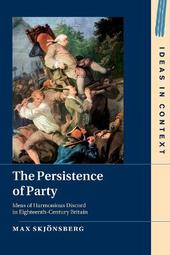
|
The Persistence of Party: Ideas of Harmonious Discord in Eighteenth-Century Britain
Paperback / softback
Main Details
| Title |
The Persistence of Party: Ideas of Harmonious Discord in Eighteenth-Century Britain
|
| Authors and Contributors |
By (author) Max Skjoensberg
|
| Series | Ideas in Context |
|---|
| Physical Properties |
| Format:Paperback / softback | | Pages:389 |
|
| Category/Genre | British and Irish History
Social and political philosophy |
|---|
| ISBN/Barcode |
9781108794992
|
| Classifications | Dewey:324.241009033 |
|---|
| Audience | | Professional & Vocational | |
|---|
| Illustrations |
Worked examples or Exercises
|
|
Publishing Details |
| Publisher |
Cambridge University Press
|
| Imprint |
Cambridge University Press
|
| Publication Date |
15 December 2022 |
| Publication Country |
United Kingdom
|
Description
Political parties are taken for granted today, but how was the idea of party viewed in the eighteenth century, when core components of modern, representative politics were trialled? From Bolingbroke to Burke, political thinkers regarded party as a fundamental concept of politics, especially in the parliamentary system of Great Britain. The paradox of party was best formulated by David Hume: while parties often threatened the total dissolution of the government, they were also the source of life and vigour in modern politics. In the eighteenth century, party was usually understood as a set of flexible and evolving principles, associated with names and traditions, which categorised and managed political actors, voters, and commentators. Max Skjoensberg thus demonstrates that the idea of party as ideological unity is not purely a nineteenth- or twentieth-century phenomenon but can be traced to the eighteenth century.
Author Biography
Max Skjoensberg is a postdoctoral research associate in the Department of History at the University of Liverpool. An intellectual and political historian of the eighteenth century, he has published articles in the Historical Journal, Journal of British Studies, History of Political Thought, Modern Intellectual History, and History of European Ideas. He has previously lectured in history and political theory at the University of St Andrews and the University of York. In addition to being awarded the 2013 Skinner Prize from the University of London, he was David Hume Fellow at the Institute for Advanced Studies in the Humanities at the University of Edinburgh in 2018, and received the Parliamentary History Essay Prize in 2020.
Reviews'The Persistence of Party is an original book. Skjoensberg offers a rich intellectual history revolving around the discussion of party politics in eighteenth-century Britain.' Antong Liu, LSE Review of Books 'The reader of his book learns not only much about neglected figures in the history of the theory of party politics, like Rapin, Brown, and several others whom I have not been able to discuss here, but also much about the ever-changing nature of party politics in Britain during this period, from the start of Whig hegemony in 1714 to the cleavage of the Whig party into Foxites and Pittites in the 1790s. The theoretical point, ... is that the study of the history of political thought sometimes needs to be at the same time study of the details of real-world political practice.' James A. Harris, History of European Ideas 'Max Skjoensberg traces the 18th-century dialogue about this 'enduring and crucial part of British politics' in his outstanding new book, The Persistence of Party.' William Anthony Hay, Law & Liberty 'In The Persistence of Party, Max Skjoensberg proves himself an outstanding guide through this fruitful but complex period ... Any student of constitutionalism will benefit from this thorough treatment of a rich period of political history.' John G. Grove, Kirk Center 'Skjoensberg's study ... helps us remain alert tothe dangers that lurk if we fail tofind ways to channel party so as to lower, rather thanraise, the temperature. Skjoensberg's title is thus well chosen. Whilst he does notpretend that the eighteenth century will somehow magic up answers for the twenty-first,he rightly encourages us to take on board a key lesson of the eighteenth century: that party will persist.' John G. Grove, Law & Liberty 'At the book's core are rich discussions of printed and archival primary sources ... Recommended.' M. G. Spencer, Choice Magazine 'Skjoensberg has produced an important and well-written book ... It should be required reading for anyone wanting to understand thinking about party in this period.' Andrew C. Thompson, Intellectual History Review 'Max Skjoensberg's informative and engaging new book ... addresses the way political thinkers grapple with the perils of partisanship ... It is clearly organized, and Skjoensberg presents the arguments crisply and directly. The source base is impressive and includes correspondence and papers alongside the published works. At a time when partisan polarization seems more dangerous than ever, this book provides an illuminating look at the origin of those concerns.' Chris Dudley, Journal of British Studies
|